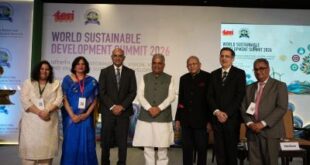– PJTSAU Validates Marut’s Innovation for Multi-Nozzle Seed Dispensing Device for Direct-Seeded Rice via Drones
– Aims to Seed 1 Million Hectares of Land Using Drones by 2030 to Address the Rice Production Challenge in India
February 22, 2024 – Mumbai/Hyderabad, India: Marut Drones, India’s leading drone manufacturer, has been granted the world’s first utility patent for a term of 20 years starting from November 29, 2021, under the provisions of the Patents Act, 1970. This patent recognizes Marut’s direct seeding drone, developed in collaboration with Prof. Jayashankar Telangana State Agriculture University (PJTSAU), which incorporates a multi-nozzle aerial seed dispensing device. With this patent, Marut Drones endeavors to facilitate the widespread adoption of direct seeding drones for rice cultivation at the grassroots level.
Marut’s seeding drones have obtained the patent following scientific validation by PJTSAU, which has also released Standard Operating Procedures (SOPs) for their use. This validation underscores the reliability and efficacy of the technology in enhancing rice production.
The patented system enables the aerial dispersion of diverse rice seeds through a meticulously designed multi-nozzle mechanism, optimizing the efficiency and effectiveness of seed-sowing processes. Marut has adhered to standard operating procedures for seeding, ensuring precise parameters such as drone speed, swath width, nozzle type and pressure, spray volume, spraying altitude, and droplet size in Direct Seeded Rice (DSR) using drones.
Prem Kumar Vislawath, CEO and Founder of Marut Drones, emphasized, “This patented technology will revolutionize rice farming practices in India. By reducing on-farm manual labor through drone technology, we aim to address the persistent challenges faced by farmers, particularly labor shortages due to rapid urbanization. From seeding paddy to controlling mosquitoes and pests in rice fields, labor costs pose significant hurdles. Through our collaboration with PJTSAU, we seek to promote the widespread adoption of Direct Seeded Rice (DSR) through drones, fostering a more economically viable and sustainable rice cultivation ecosystem.”
Marut’s direct seeding drone is a multi-utility attachment, enabling farmers to utilize drones not only for pesticide application/spraying but also for direct seeding, thereby accelerating Return on Investment (ROI). This multi-functionality allows the drone to be utilized round the year, justifying its name AG365.
By leveraging Marut Drones’ innovative DSR drones, farmers can achieve a remarkable 92% reduction in water usage, significantly accelerating ROI and profitability timelines from 3 years to just 1.5 years. The DSR drones are highly feasible under delayed monsoons, late release of canal water, or other contingency situations, addressing major challenges faced by rice farmers.
Traditional obstacles such as nursery time, transplantation, and skilled labor shortages are effectively mitigated, empowering farmers with enhanced operational efficiency and flexibility. With Marut’s DSR drones, farmers can sow up to 30 acres in a single day, requiring only 33,333 man-days to cover 500,000 acres compared to the 50 lakh man-days required for manual transplanting. Moreover, this technology minimizes operational exposure to harmful pesticides during pest outbreaks.
Through extensive trials conducted across 5 states, Marut Drones is poised to revolutionize rice farming practices nationwide. As India grapples with the impending dip of 2 million tons in rice production, creating disruptions in the global rice market, Marut Drones aims to seed 1 million hectares of land by 2030.
By fortifying food security efforts with its patented technology, Marut emerges as a frontrunner in innovation. The company’s comprehensive training programs targeting farmers, rural youth, students, and agricultural stakeholders will promote the adoption of direct seeding in rice cultivation using drone technology.
Marut’s patented technology not only opens avenues for rural employment but also encourages the establishment of Community Health Centers (CHCs) facilitated by Farmer Producer Organizations (FPOs) and Women Self-Help Groups.
 Newspatrolling.com News cum Content Syndication Portal Online
Newspatrolling.com News cum Content Syndication Portal Online






